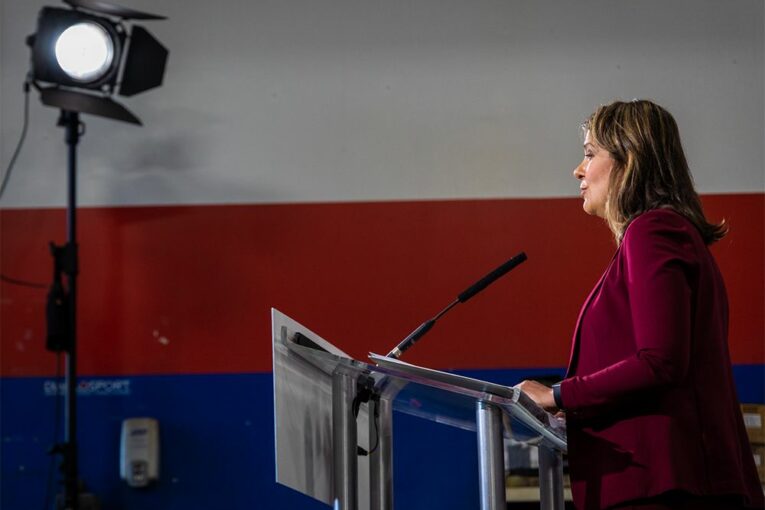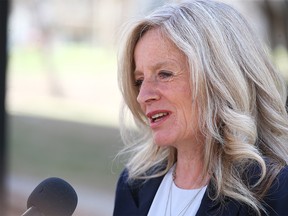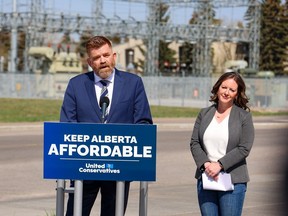
How much will it cost Albertans to move to a net-zero power grid by 2035?
It’s a fair question about a complex issue.
The short answer, if we’re all being totally honest, is that no one really knows because key details still need to be worked out.
Yet, for a province that relies on natural gas to generate a lot of electricity — even with an investment bonanza streaming into renewables — it’s going to come with costs to meet the federal target within a dozen years.
And it’s going to need some flexibility to make it all happen.
According to the UCP, the price for Alberta will be sky high, with the party saying Wednesday the costs to the provincial economy and consumers would hit at least $87 billion, although it soon faced pushback on that amount by the consultants it hired to assess the overall economic effect.
Its assertion was based on a report from the Alberta Electric System Operator (AESO) last summer — it pegged the costs of reaching net-zero by 2035 in the power sector between $44 billion to $52 billion — along with a new study the UCP commissioned by Navius Research.
The party released its report while pointing out NDP Leader Rachel Notley previously committed to hitting the net-zero target by 2035, calling it the “most expensive promise in Alberta political history.”
The UCP hired B.C.-based Navius to look at the impact of reaching net-zero in Alberta’s power sector on the provincial economy.
It concludes the federal Clean Electricity Regulations (CER) would have a cumulative effect on the provincial gross domestic product (GDP) of about $35 billion by 2040.
“Independent analysis says that even if this can be done, it will cost Albertans and the Alberta economy at least $87 billion,” UCP candidate Brian Jean told reporters Wednesday, adding the two figures together.
Yes, that would be a lot of loot, if true.
Recommended from Editorial
-

Alberta Election 2023 live: May 4 updates
-

UCP faces questions on how it did the math in attack on NDP electricity plan
-

Notley, Smith pitch swing voters in Calgary campaign stops
-

David Staples: Your rising power bills could well define the outcome of the Alberta election
-

AESO report outlines costs, challenges to achieving net-zero power grid by 2035
But by the end of the day, Navius put out a string of tweets saying it wanted to “set the record straight.”
“It’s important to acknowledge that reducing emissions will likely come at a cost,” it said.
“This $35 billion already accounts for, and is not additive to, the investment estimated in the AESO report. The cost to Alberta’s economy reported in the media today is more than double what our model suggests it will be.”
Ignoring the fact it was the UCP using these figures, some experts aren’t convinced about the AESO figures, either.
“I don’t put much credence in them,” electricity expert Blake Shaffer, an economist at the University of Calgary, said Wednesday.
He pointed out the AESO report used assumptions for wind and solar prices that are far higher than what the marketplace is now seeing.
On the campaign trail, Notley dismissed the UCP’s attack.
“The study that they are basing their numbers on fails to take into account the opportunities that come from technological innovation, opportunities that industry themselves are saying that they can use,” she said.

It’s worth pointing out that wind and solar investment is growing rapidly in Alberta. Yet, using natural gas to generate electricity — creating greenhouse gas emissions in the process — is critical.
At the end of 2022, purely gas-fired generation made up about 60 per cent of the province’s installed generation capacity, while renewable generation was 31 per cent, roughly double the levels since 2018, according to AESO.
And as anyone who opens a utility bill knows, power prices have been heading up over recent years, making it a sensitive political issue.
The Navius report has plenty of cautionary notes and assumptions that it had to make in the various scenarios it examined.
To be fair, some areas — including the details of the incoming federal Clean Electricity Regulations (CER) — aren’t certain yet.
In the study, Navius found emissions will, naturally enough, fall when the CER is adopted, while the economy grows by a lower rate, leading to a cumulative effect on GDP of about $35 billion over a two-decade span.
In a statement, Brianne Riehl of Navius said the effect on Alberta’s economy relies on AESO’s estimates of investment levels needed to reach net-zero emissions.
“The $35-billion GDP impact accounts for both the costs and benefits of this investment,” she wrote.
“Because of this, the $87 billion figure being communicated publicly . . . is not a fair representation of the costs of the policy.”
On Thursday, UCP Leader Danielle Smith wasn’t backing down, nor was Notley.
“We don’t need to issue a correction . . . We were quoting two different reports,” Smith said. “So the two together come to $87 billion.”
In Calgary, Notley said getting to net-zero by 2035 is an opportunity for growing Alberta’s economy and creating jobs, and it will be “a net gain” for economic growth.
“We’ve got Danielle Smith out there refusing to disavow what is, at the very least, a $40-billion piece of misinformation,” she said.
Jean said his government would move to get to net-zero in the power system by 2050, but couldn’t say what the costs would be for the province.

Duane Reid-Carlson, chief executive of Alberta-based electricity consultancy EDC Associates, said his firm completed its own study on the issue last year and found the costs were similar to what AESO’s study concluded.
“There’s a lot of interpretations across all of these different numbers,” he said. “The salient point is they are all in the tens of billions of dollars.”
All of this debate leaves power generators watching the political landscape, and awaiting key decisions on climate policy.
Capital Power CEO Brian Vaasjo, one of the province’s largest power generators, said Alberta may have to use offsets to reach the net-zero 2035 target and he’s not “seen or heard of any scenarios where Alberta can move forward without natural gas” used in 2035 and beyond.
“Depending on the policy direction, if it’s wrong or poor policy direction, you will either have lights going out, emissions that could have otherwise been avoided not being (prevented), or have very high costs,” he added.
“In a province like Alberta, you can’t just hope away costs or hope away emissions.”
Chris Varcoe is a Calgary Herald columnist.
You can read more of the news on source
